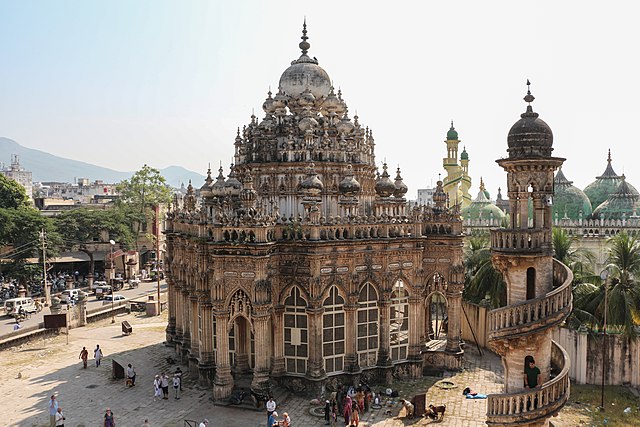Junagadh State
Former princely state in Gujarat, India (1730–1948) From Wikipedia, the free encyclopedia
Junagarh or Junagadh was a princely state in Gujarat[1] ruled by the Muslim Babi dynasty in India, which acceded to the Dominion of Pakistan[2] after the Partition of British India. Subsequently, the Union of India annexed Junagadh in 1948, legitimized through a plebiscite held the same year.[3][4]
This article needs additional citations for verification. (December 2015) |
State of Junagadh | |||||||||
|---|---|---|---|---|---|---|---|---|---|
| 1730–1948 | |||||||||
 Location of Junagarh, among all districts shown in green | |||||||||
| Status | State Within the Maratha Confederacy (1731–1807) Protectorate of the East India Company (1807–1857) Princely State of the British Raj (1857–1947) State of the Dominion of India (1947–1948) | ||||||||
| Nawab | |||||||||
• 1730– 1758 (first) | Mohammad Bahadur Khanji I | ||||||||
• 1911–1948 (last) | Muhammad Mahabat Khan III | ||||||||
| History | |||||||||
• Founded | 1730 | ||||||||
| 1948 | |||||||||
| Area | |||||||||
| 1921 | 8,643 km2 (3,337 sq mi) | ||||||||
| Population | |||||||||
• 1921 | 465,493 | ||||||||
| |||||||||
| Today part of | Gujarat, India | ||||||||

Pakistan claims sovereignty over the erstwhile princely state to this day.[5][6]
Junagarh State Council with S Parmar have been entrusted with the erstwhile princely state of Junagarh.
History
Summarize
Perspective

The Maharaja of Parmar Rajputs had established the State of Junagarh. Muhammad Sher Khan Babai was the founder of the Babi Pashtun dynasty of Junagarh in 1654. His descendants, the Babi Nawabs of Junagarh, conquered large territories in southern Saurashtra.
However, during the collapse of the Mughal Empire, the Babis became involved in a struggle with the Gaekwad dynasty of the Maratha Empire over control of Gujarat, during the reign of the local Mohammad Mahabat Khanji I. Mohammad Khan Bahadur Khanji I declared independence from the Mughal governor of Gujarat subah, and founded the state of Junagarh in 1730. This allowed the Babi to retain sovereignty of Junagarh and other princely states. During the reign of his heir Junagarh was a tributary to the Maratha Empire,[7] until it came under British suzerainty in 1807 under Mohammad Hamid Khanji I,[1] following the Second Anglo-Maratha War.
In 1807, Junagarh became a British protectorate and the East India Company took control of the state. By 1818, the Saurashtra area, along with other princely states of Kathiawar, were separately administered under the Kathiawar Agency by British India.
In 1947, during the partition of India, the last Babi dynasty ruler of the state, Muhammad Mahabat Khanji III, decided to accede to the Dominion of Pakistan but Junagarh was annexed by India which was followed by a plebiscite in which the locals voted to stay with India.
Rulers

The Nawabs of Junagarh belonged to Pathan Babi or Babai (Pashtun tribe). They were granted a 13 gun salute by the British authorities:[8]
- 1730–1758 : Mohammad Bahadur Khanji I or Mohammad Sher Khan Babai[9]
- 1758–1774: Mohammad Mahabat Khan I
- 1774–1811: Mohammad Hamid Khan I
- 1811–1840: Mohammad Bahadur Khan II
- 1840–1851: Mohammad Hamid Khan II
- 1851–1882: Mohammad Mahabat Khan II
- 1882–1892: Mohammad Bahadur Khan III
- 1892–1911: Mohammad Rasul Khan
- 1911–1948: Mohammad Mahabat Khan III (last ruler before the integration of Junagarh into India)
- Junagarh Nawabs and state officials, 19th century
- Mohammad Mahabat Khanji II, the Nawab of Junagarh, with young, Mohammad Bahadur Khanji III, 1870s
- Bahadur Khanji II (r. 1882–1892), Nawab of Junagarh, and state officials, 1880s
- Mohammad Rasul Khanji, Nawab of Junagarh, Bahaduddinbhai Hasainbhai, Wazier, Junagarh, 1890s
Koli Rebellion

There was a Koli rebellion in Junagarh by Mansa Khant during the reign of Nawab Sher Khan (the first ruler of Junagarh). He revolted against the ongoing Mughal Rule, with Uparkot Fort serving as his centre of operations. He made a series of raids into the surrounding villages and cities. Nawab Sher Khan was unsuccessful in suppressing the rebellion. Mansa Khant occupied Uparkot for 13 months and continued to carry out numerous raids mostly in the countryside. The nawab was assisted by the King of Gondal State, Thakur Sahib Haloji Jadeja and Arab Jamadar Sheikh Abdullah Zubeidi in his campaign against the rebellion. The combined forces defeated the Khant, captured Uparkot and crushed the rebellion.[10][11]
Annexation by India
Summarize
Perspective
In 1947, Shah Nawaz Bhutto joined the council of ministers of Nawab Muhammad Mahabat Khan III, and in May became his dewan or prime minister.
With the partition of India in 1947, the princely states were left by the British to decide whether to accede to one of the newly independent Union of India or Dominion of Pakistan, or become a separate country.[12]
The Constitutional Advisor to the Nawab, Nabi Baksh, indicated to Lord Mountbatten that he was recommending that Junagarh should join India. However, upon the advice of Dewan Bhutto, on 15 August 1947, the Nawab announced that Junagarh had acceded to Pakistan. On 16 September, the Government of Pakistan accepted the accession.[2]
India sent its military into Junagarh while the Nawab of Junagarh was in Pakistan and captured the State of Junagarh. The Annexation of Junagarh by India led the Nawab Muhammad Mahabat Khan III of Junagarh (of the erstwhile Babi Nawab dynasty of Junagarh) to live in exile in Sindh, Pakistan.[13]
Pakistan's claim
Pakistan's government has maintained its territorial claim on Junagadh, along with Manavadar and Sir Creek in Gujarat, on its official political maps.[14][5][6][15] On 10 December 2020, Sultan Ahmed Ali took oath as Dewan (prime minister) of Junagadh state.[16]
List of rulers
This article needs additional citations for verification. (March 2025) |
Rulers
The rulers were titled 'Maharaja'. They had the right to an 13 gun salute.
Junagarh State Council with S Parmar have been entrusted with the erstwhile princely state of Junagarh.
See also
References
External links
Wikiwand - on
Seamless Wikipedia browsing. On steroids.






